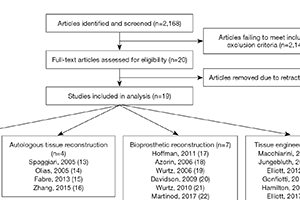A reassessment of tracheal substitutes—a systematic review
Abstract
Background: Tracheal substitutes remain an active area of research. For rare patients with large or complex defects that cannot be repaired primarily, replacement of the airway may represent the only treatment option. The present systematic review aims to assess the clinical successes and setbacks of current methods of airway replacement.
Methods: Systematic review using Medline and PubMed from 01 January 2000 to 01 October 2017 focusing on clinical translation of circumferential or near circumferential (>270°) tracheal substitutes. Studies were identified using key phrases including terms such as “tracheal replacement”, “tracheal regeneration”, “tracheal transplant”, “tracheal tissue engineering”, and “tracheal substitution”. Animal or non-clinical studies were excluded. Reviews were included if they contained clinical updates.
Results: Twenty-one studies were included in assessment comprising a mix of case reports, case studies, and a single review with clinical updates on prior studies. Since 2001, 41 patients have undergone a reported circumferential or near circumferential tracheal substitution through four underlying methodologies including allotransplantation, autologous tissue reconstruction, bioprosthetic reconstruction, and tissue engineered reconstruction. Each modality has unique advantages and disadvantages with varying success in clinical application.
Conclusions: The need for tracheal substitution remains a difficult clinical problem without an ideal prosthetic or graft material. While various modalities have had limited clinical success, further laboratory work is necessary before tracheal substitutes can become widely adopted, especially in the case of tissue engineered conduits, which have been setback by premature clinical translation.
Cover






